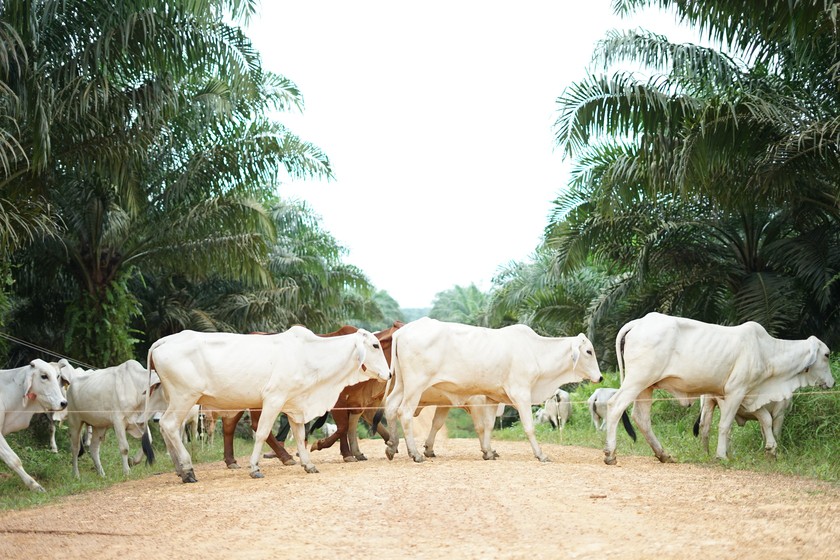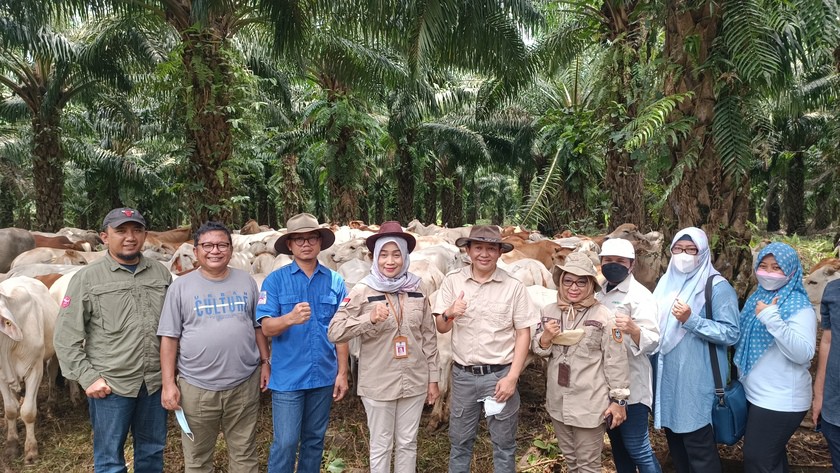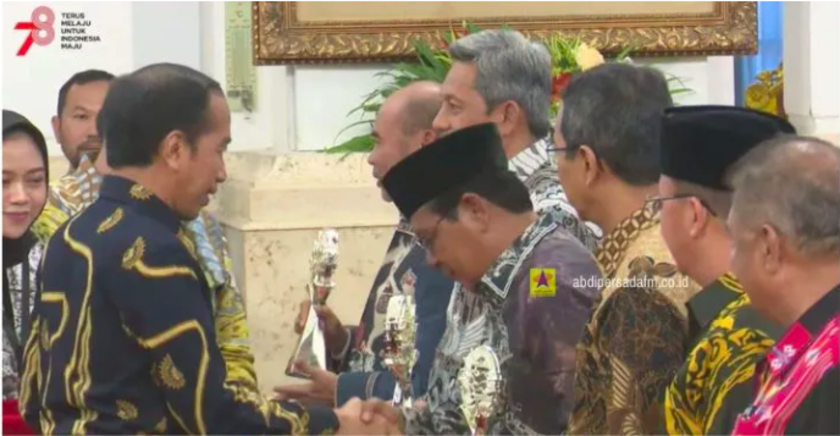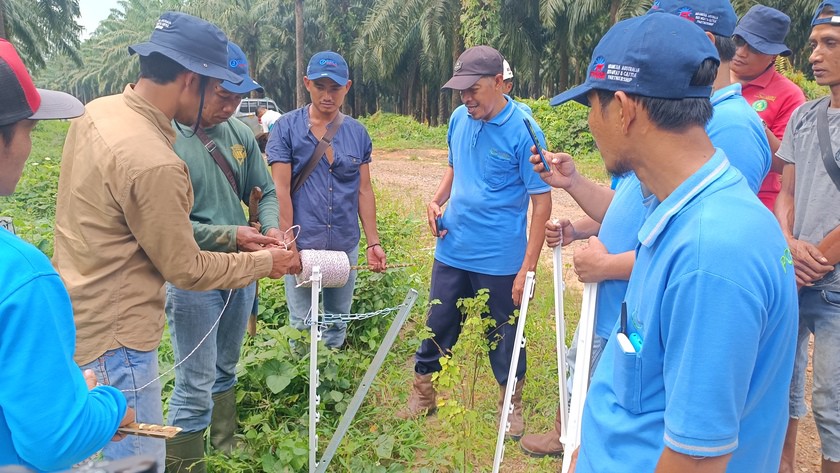Strengthening Food Security in South Kalimantan through ‘SISKA KU INTIP’
The demand for beef in South Kalimantan Province is considerably more than local farmers can supply.
According to the local livestock and plantation office, the demand for beef in 2022 was 6.9 million tons, equivalent to 52,000 cattle, while the availability of local ready-to-slaughter cattle was only 27,000 head, or just 52% of the province’s needs. The 400,000 hectares of palm oil planations in South Kalimantan does however provide a great opportunity to reduce this shortfall through a cattle breeding model known as SISKA.
SISKA brings together palm oil companies and smallholder farmers to form a mutually benefiting commercial partnership, or ‘cluster’, to manage cattle within palm oil plantations. The model provides a clear ‘win-win’ for both. Smallholder farmers have access to palm oil waste-products that is used as a low-cost and nutritious feed supplement, whilst palm oil firms waste disposal costs are reduced. Firms also benefit as cattle provide organic fertiliser which increases plantation productivity, and as cattle graze on understory weeds they reduce the need for herbicides.
The use of electric fences, a key SISKA requirement, allows rotational grazing and prevents cattle damaging young palm oil trees, previously a serious cause of tension between palm oil farm managers and smallholder farmers. Finally, farmers guarding their cattle 24 hours a day prevents the theft of palm fruit. These ‘Win-Win’ outcomes are enhancing social harmony and providing a tangible and effective way for palm oil firms to deliver on their Corporate Social Responsibility (CSR) requirements.
Four provincial governments have noted these benefits and are now working with the SISKA Supporting Program (SSP)[2] to develop their own SISKA approach and strategy. For example, with support from SSP, the South Kalimantan provincial government is now actively encouraging the uptake of SISKA through a 2021 Governor Decree called ‘SISKA KU INTIP’ which established SISKA KU INTIP as a government ‘Priority Program’. As a result, all palm oil plantation companies in the province are now encouraged to implement SISKA by 2024. The regulations ultimately aim to achieve beef self-sufficiency in the province, the ability to supply beef for Indonesia’s new capital city in East Kalimantan, and to move from a net importer to an exporter of cattle and beef.
“Ultimately, we hope that SISKA KU INTIP will allow our province to provide for both provincial and national beef needs, including for the new capital city” – Suparmi, Head of Plantation and Livestock Office of South Kalimantan Province.
The South Kalimantan provincial government’s commitment to SISKA expansion was also demonstrated through the allocation of electric fences, funded by the regional budget, that are now allowing the rotational grazing of cattle in SISKA clusters. The provincial government also collaborated with the regional development bank (Kalsel Bank) to provide government-guaranteed loans to the smallholder farmers that has strengthened and grown their cattle businesses. The central government is also supporting SISKA KU INTIP with the provision of quality bulls which are already improving cattle genetics and cattle pregnancy rates.
After only two years SISKA KU INTIP has improved cattle production and beef prices in South Kalimantan, which has led to South Kalimantan receiving various prestigious awards, include one in 2023 for regional inflation control (TPID).
“With SISKA KU INTIP, cattle production costs have become more affordable as cattle can use the feed sources in palm oil plantations. Cattle production is 57% more efficient compared to conventional production, so we can now provide beef below the market price,” – Sahbirin Noor, Governor of South Kalimantan.[3]
Drawing on lessons learnt from South Kalimantan the SSP now also supports SISKA expansion in East Kalimantan, West Kalimantan and Riau. This includes the delivery of training to develop a competent SISKA workforce, a critical requirement for SISKA expansion. The training is conducted through the Bhakti Surya Training Centre (BSTC), which was established by Buana Karya Bhakti (BKB), a palm oil firm in South Kalimantan, with SSP support. The BSTC is now providing certified SISKA competency training for SISKA operators, supervisors, and managers, smallholder farmers and government officials, as well as on-the-job training and internships for young farmers.
The SSP also established the SISKA Actors and Observers Association (GAPENSISKA) in 2022, which has a remit to promote SISKA expansion through advocacy to government and through SISKA research and public communications. GAPENSISKA has already collaborated with four provincial governments to develop SISKA Road Maps that are now being used to guide SISKA expansion. Business prospectuses have also been developed that are now facilitating farmer access to financing and new markets.
To date SSP has supported the establishment of 51 smallholder farmer/oil palm firm clusters which are supporting the livelihood of more than 890 farmers who manage more than 7,200 cattle across 123,000 hectares of palm plantation. The growth potential from this very strong base is huge. For example, the Plantation and Livestock Office of South Kalimantan Province noted that, as of July 2023, only 22,501 hectares of oil palm plantation in the province are currently being used for SISKA, whilst the total potential area is 250,000 hectares, which could accommodate 125,000 head of cattle.[4]
“There is the enormous potential for SISKA development to meet the provincial and the wider regional demand for beef, to accelerate beef self-sufficiency, and increase food security. We really hope that SSP can continuously accompany and support us in developing SISKA in South Kalimantan,” – Suparmi, Head of Plantation and Livestock Office of South Kalimantan Province.
[1] https://www.kompas.id/baca/nusantara/2022/08/22/kalsel-kejar-swasembada-daging-lewat-integrasi-sawit-sapi
[2] Funded, since 2021, by the Australia Partnership on Food Security in the Red Meat and Cattle Sector (Partnership)
[3] https://abdipersadafm.co.id/2023/03/09/gubernur-kalsel-terus-dorong-peningkatan-program-siska-ku-intip/
[4] https://www.elaeis.co/berita/baca/baru-9-persen-lahan-potensial-di-kalsel-dimanfaatkan-untuk-siska-ku-intip













